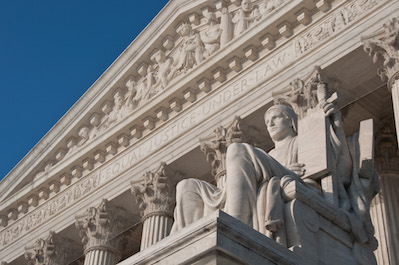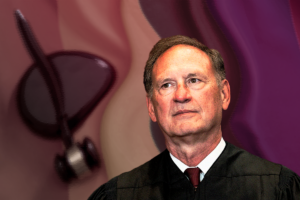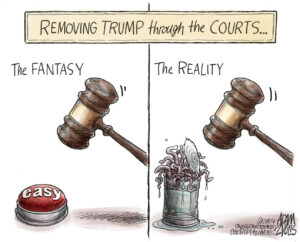‘One Person, One Vote’ Supporters Better Keep the Bubbly on Ice
The Supreme Court’s ruling was a win for advocates of counting every resident in drawing up election districts. But it leaves the door open for future mischief by those who hope to weaken the voices of minority voters. "The Guardian," or "Authority of Law," statue sits in front of the Supreme Court building in Washington, D.C. (Mark Fischer / CC BY-SA 2.0)
"The Guardian," or "Authority of Law," statue sits in front of the Supreme Court building in Washington, D.C. (Mark Fischer / CC BY-SA 2.0)
If you follow constitutional law and the Supreme Court, you’ve no doubt seen the headlines announcing Monday’s unanimous ruling on apportionment and voting rights in Evenwel v. Abbott. Most of the stories on the case, like the one published by The New York Times, describe the decision as a resounding victory for liberals, a thrashing for conservatives, and an affirmation of the time-honored principle of “one person, one vote.”
I don’t mean to minimize the decision’s importance, but after reading through both the actual opinion and the testy and grudging concurrences by Justices Samuel Alito and Clarence Thomas, I think the court’s action might better be characterized as cause for relief among liberals and progressives rather than grounds for outright celebration. The rule of “one person, one vote” survived court scrutiny, but in a fashion that leaves the door open for a great deal of mischief by those with further designs to weaken the voices of minority voters.
The Evenwel case arose when the Texas Legislature redrew its Senate maps in 2013, using total population figures to define the state’s 31 senatorial voting districts. Two residents objected to the new district lines, and with the financial backing of the Project on Fair Representation—a right-wing, nonprofit legal defense fund in Austin—filed a lawsuit to block their implementation. The plaintiffs argued that instead of using total population as the operative apportionment metric, the Legislature should have mapped out voting districts solely on the basis of residents who are eligible to vote.
I discussed Evenwel last September in my annual Supreme Court preview for Truthdig, noting that under decades-old precedent construing the Equal Protection Clause of the 14th Amendment, legislative districts must be devised as closely as possible to the ideal of “one person, one vote,” roughly equalizing populations in each district so that no individual’s vote carries more weight than any other’s when electing state and federal representatives.
However, the court’s prior apportionment decisions left the issue raised by the Evenwel plaintiffs—whether all state residents should count in setting legislative district boundaries or only those who are registered to vote—unresolved.
In bringing the lawsuit, the Project on Fair Representation (PFR) hoped to build on its success in Shelby County v. Holder, the 2013 case it similarly bankrolled that gutted the Voting Rights Act. The PFR is also the financial force behind the current challenge to affirmative action pending in the Supreme Court—Fisher v. University of Texas at Austin.
As I explained in my September preview, the PFR did not finance the Evenwel litigation out of academic curiosity or scholarly interest. It wanted the Supreme Court to hold that registered voters are the operative population group in order to weaken the political clout of Hispanics, who lean Democratic, tend to have big families and whose communities include large numbers of undocumented immigrants who cannot vote. With such people excluded for apportionment purposes, Texas Hispanics could legally be gerrymandered into fewer voting districts, diluting their electoral potential.
Writing for the court’s majority, Justice Ruth Bader Ginsburg rejected the PFR’s suit to overturn the Texas district lines and upheld the constitutionality of the Texas plan. However—and this is why I’d recommend keeping the champagne on ice—her opinion does not hold that states must use total population rather than voting population in drawing their legislative boundaries.
Although all states at present use total population as their basic apportionment metric, the door remains open for states to use voting population in the future. Had Texas decided to do so in 2013, Monday’s decision may well have resulted in a 4-4 liberal-conservative stalemate. Indeed, if Justice Antonin Scalia, the court’s conservative standard-bearer, had not died in February, the ultimate decision could have been markedly different.
So score the Evenwel ruling as a win for liberals, albeit one by which they largely dodged a bullet but by no means put to rest the dangers of future discriminatory gerrymandering or other forms of voter suppression.
Your support matters…Independent journalism is under threat and overshadowed by heavily funded mainstream media.
You can help level the playing field. Become a member.
Your tax-deductible contribution keeps us digging beneath the headlines to give you thought-provoking, investigative reporting and analysis that unearths what's really happening- without compromise.
Give today to support our courageous, independent journalists.









You need to be a supporter to comment.
There are currently no responses to this article.
Be the first to respond.